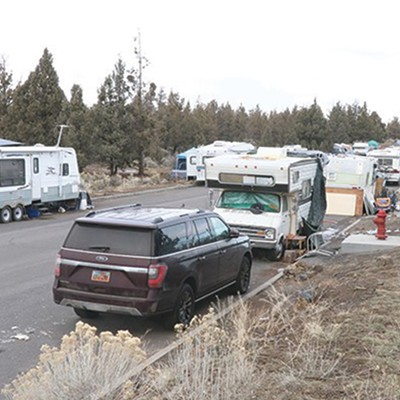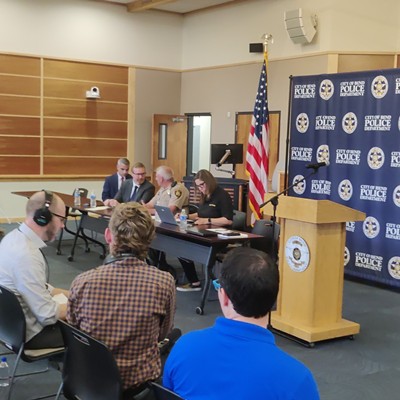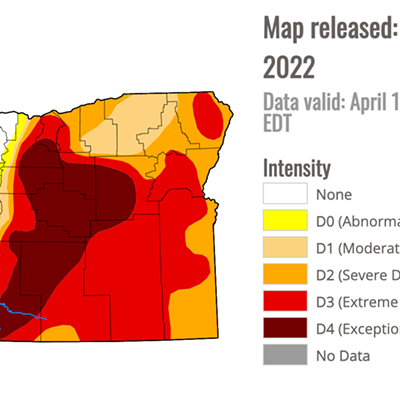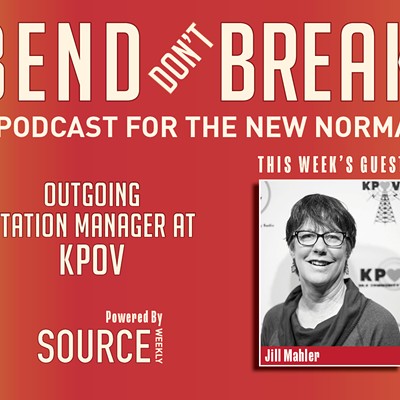Mayor Jim Clinton chose not to seek re-election this year to a fourth term on Bend City Council. The Source Weekly caught up with him recently to chat about the past 12 years in office, where Bend is today and what the future holds.
The Past
Clinton’s political journey started with elk.
He and his wife Judy moved to Central Oregon in 1995, choosing a rural plot of land just south of Bend. Within just a few years, they were involuntarily annexed into the city. Then the developers pounced.
“It was a period of rapid growth and rapid change. It seemed to us that open space and in particular wildlife habitat was disappearing ,” he said.
Clinton lived near Elk Meadow, which received its namesake for the herds of elk that visited every year. When Clinton heard that the meadow he loved would soon be covered with homes, he founded the Save Elk Meadow campaign.
Clinton holds a Ph.D. in physics and doesn’t rush into things. He met with the mayor, with editorial boards, with anyone who cared about how Bend should develop.
“The difference was that we weren’t just complaining,” he said. “We had a plan for how this could work.”
That thoughtful approach and willingness to compromise ended in a deal. The meadow survived with a wildlife corridor. In return for preserving that open space, the developer was allowed to build a few more houses to keep profits up.
Elk Meadow made Clinton a player in Bend political circles. He helped establish the city’s neighborhood associations and was the first president of the Southwest Neighborhood Association. He also got involved in the council elections, helping get a slate of progressive candidates elected that included now-District Attorney John Hummel and Bruce Abernethy, who is running again tofill Clinton’s seat this year.
Clinton landed on the city’s Budget Committee, where he learned more of the nuts and bolts about the city. “I started going to all of the city council meetings,” he said. “It was interesting and totally different from anything I’d ever done.”
Then he ran for council. He lost on his first bid in 2002 but won in 2004. He’s been on council ever since, and his fellow councilors chose him as mayor in 2013 and again in 2015.
Clinton doesn’t identify any one or two decisions as the most important or profound from his time on council. Instead, when reflecting on the past dozen years, he focuses on his leadership style.
“You survive in the political arena partly by avoiding making people too angry, so I’ve taken a reasoned approach to issues independent of lobbying and special interests,” he said. “I’ve been a voice for stability, helping create a stable political environment so that the city manager can do his job.”
Clinton added that he thinks current City Manager Eric King has become very effective since taking over in 2007. Several tumultuous years at the position preceded King, including a period of four city managers in five years.
Clinton also praised the performance of the police and fire departments in recent years. He contrasted the Bend Police Department to law enforcement agencies across the country that have experienced incidents of police violence, noting that Bend officers “go the extra mile to avoid situations where things escalate and someone is hurt or killed.”
When asked about low points during his tenure and decisions he regrets, Clinton said, “I don’t really see, in retrospect, where I made any significant mistakes.”
That said, he noted that critics took advantages of some decisions “to continuously hammer over and over.” He pointed to council’s decision to purchase the old Bend Bulletin property at NW Wall Street and NW Olney Avenue. He called it bad timing, not a mistake. The city bought the still-vacant property at the peak of the housing bubble.
He also identified the purchase of defective buses in 2006 as a common point of criticism. “It’s ridiculous to pin that on council,” he said. “Council did not go to California to test the buses. We relied on staff for that.”
The Present
Even if he’s not running for re-election, Clinton still has several months left as mayor. He and the rest of council will grapple with several high-profile issues, including growth and an urban growth boundary (UGB) expansion, transportation, and a controversial climate change resolution.
There’s little the city can do to stop growth, and state land-use law requires an adequate supply of land inside the UGB to accommodate it. About 84,000 people live in Bend now, and the population is forecast to reach 115,000 by 2028. The UGB must grow.
“It’s such an attractive place here in Bend. It’s not like people are going to stop wanting to live here, but you have to keep it attractive for the people who are already here,” he said.
Last week, Clinton spent 8½ hours at a public hearing on the UGB expansion. Hundreds of people showed up to testify.
The current UGB proposal is a pared down version of the one that the state rejected a couple of years ago. This one focuses more on in-fill development and greater density.
Clinton thanked city staff for shepherding this multi-year project through all of the hoops. “The city does a good job with land use planning,” he said.
Asked whether he saw any parallels between the current UGB expansion and his own involuntary annexation two decades ago, Clinton said this time was different. Property owners on Bend’s periphery are clamoring to be added.
“Almost all of the testimony we heard was from people wanting to be in. If people are unhappy, it’s because they didn’t get more [land] in,” he said.
In the newly annexed areas, the city will emphasize what he calls “complete neighborhoods,” which he describes as places with a mix of housing types, shopping and jobs.
Clinton and council also recognize that growth and increasing property values could price a lot of service workers out of the community. He praised Jim Long, the city’s affordable housing manager, for working with council to make sure affordable housing remains a priority. “We’re way ahead of any other city in Oregon,” he said.
With more residents and
more tourists visiting Bend these days, the city’s transportation infrastructure is feeling the squeeze, but money for upkeep and improvements is in short supply.
“It’s not possible to find in the existing budget the money to keep the roads fixed properly,” Clinton said. That’s why he pushed for a
five cents-per-gallon fuel tax. Voters soundly rejected it in a March special election.
Even if it had passed, the city’s options are limited, according to Clinton. Limitations on land prevent the city from widening some of its busiest streets. Besides, he said, Bend can’t just build its way to better transportation infrastructure. Road improvements are part of the solution, but the city needs to go further.
“The trend is clear: If we don’t do something different, we’re going to be in a big mess,” he said.
Clinton suggested creating services and infrastructure that allow people to get around without driving. That means more public transportation, more bike lanes and more sidewalks. People need to be able to choose to get to their destination in a less impactful way.
Fewer cars would be good for the environment, too, an important factor as City Council considers a
climate change resolution that would call for the city to reduce greenhouse gas emissions. Council originally considered a broader ordinance, but dialed it back to a resolution in the spirit of compromise.
Nevertheless, it has drawn the ire of some in the business community and some editorial writers. There has even been a group of climate change deniers lobbying against it, according to Clinton.
He pointed out that council is responding to a request from city residents that Bend be part of the solution. Council is not acting out on its own.
“No, we aren’t going to solve climate change singlehandedly as a city,” Clinton said. “We all know that we have contributed to the problem. Now we ought to do our part to help fix it.”
He predicts that the resolution will ultimately be good for Bend, despite the naysayers. If the city commits to reducing fossil fuel use, it has an opportunity to save a lot of money. Moreover, many modern businesses weigh the character of communities when deciding where to locate. “They want to see that you’re on board with the future instead of clinging to the past,” Clinton said.
Clinton the physicist is more pessimistic about the big picture, though. “I don’t know if humanity is capable of addressing a problem like this,” he said. “It’s the first time in our history as a species where we’ve altered the atmosphere of the entire planet.”
The Future
Clinton chose not to run for re-election in part because he wants to have more time to work as a physicist and to pursue other opportunities.
“I spent a lot of political capital on the gas tax campaign,” he said. “I just don’t want to do it anymore. I want to do something else. I’ve done the city thing for 12 years and it seems like a good time to step down.”
“This present council is more progressive than any in history, including the early 2000s,” he added.
He urges the next council to help Bend reform its government to reflect its size. “We have a small-town city council structure in what is becoming a big city,” he said. “It’s the small-town thinking that continues to hold Bend back.”
To that end, he has two changes in mind.
First is an elected mayor. Under the current system, voters elect council members who then choose the mayor from among themselves.
An elected mayor, Clinton suggested, would allow for better leadership and accountability at City Hall. He’s not advocating for a strong mayor system. Rather, he wants to people to be able to hold a referendum on competing visions between mayoral candidates, while a city manager implements whichever is selected.
Second, he believes council members should make more money. The current $200 per month does not reflect the time that councilors put into the job.
“It locks out people who are trying to pursue a career,” he said. “You’re more likely to get candidates who are wealthy, retired or have an axe to grind. If Bend thinks a city pushing 100,000 residents can be governed by volunteers, it will get a volunteer result.”
Clinton believes that if those changes were made, city government would be more representative and more responsive to the people.
Looking over the candidates running for council this fall, Clinton is optimistic that the city will continue on a good course.
He also hopes more people in the future will follow the same course he did all those years ago with Elk Meadow.
“I encourage everyone to pay attention to what the city is doing and to get involved. Bend is of the size where individuals can still make a difference,” he said. “See the value of what Bend is and the value of what it could be. Get involved. Make it happen.”

























